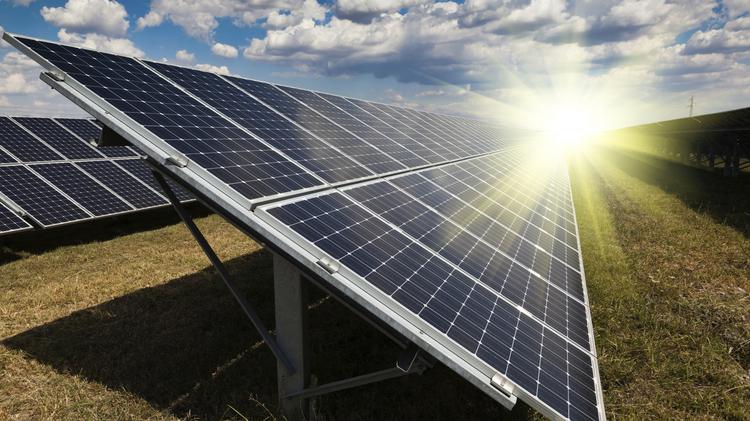By Katie Stancombe
TheStatehouseFIle.com
INDIANAPOLIS – Three years ago, Phil Teague made the decision to quit his job, relocate from California to Indiana, and build his own solar business in hopes that the state’s clean energy market might flourish.
To his delight, it did.
“The thought process was if we started in Indiana and became successful and profitable in Indiana, we could be successful anywhere,” said Teague, founder and owner of Rectify Solar, a company that installs residential and commercial rooftop solar units.

Pastor T. Wyatt Watkins explains how his congregation has embraced clean energy by using solar technology. Cumberland First Baptist Church installed 36 rooftop solar panels in 2014, which has saved them roughly $1,200 per year in electric expenses. Photo by Katie Stancombe, TheStatehouseFile.com
But Teague’s increasing success in Indiana could halt if a bill that has passed the Senate eventually becomes law, because it would decrease prices utilities have to pay smaller energy generators.
Senate Bill 309, authored by Sen. Brandt Hershman, R-Buck Creek, would gradually decrease the amount of money credited through net metering – a billing mechanism that credits, or pays, individuals who generate more solar power than they need to the electric grid.
Most businesses, churches, schools and individuals that invested in solar energy said net metering was an incentive that drew them to switch from standard energy consumption. Teague said his customers are usually able to pay off their solar unit investments in 10 years or less.
However, without the benefit of net metering, Teague said he’s not sure what the future holds for his business.
“The hard part for me is that I can’t guarantee a 10-year return anymore,” he said. “It depends on when they install it. If I installed a system in the last year, in June of 2022 the return investment with net metering goes from 10 years or less to 17 years.”
SB 309 addresses three categories of solar investors: those who have already invested in solar technology, those who install rooftop solar units in the next five years, and those who invest in solar technology after 2022.
According to Hershman, those who currently have net metering would be grandfathered in for 30 years. Those who would install solar units in the next five years would be grandfathered at a full retail price for up to another 10 or 15 years, depending on when the unit is installed.
After that, solar investors would be compensated at a lesser wholesale rate, plus 25 percent.
“We’re reducing the incentive, you’re absolutely right,” Hershman said.
The Indiana Energy Association, which is in favor of the bill, said that they think the legislation strikes a fair balance moving forward.
“At the moment, customers are credited at the full retail price where everything that they generate, whether they use it themselves or send it back out onto the utilities system,” said IEA president Mark Maassel. “We’d like to see customers have the ability to install generating options if they choose to. The other side of that is, we think that they should pay their costs for the use that they make on the grid and other such things – no matter what size it is.”
As of now, a retail price is credited to everyone who generates solar power. This fluctuates between 11 and 13 cents per kilowatt-hour generated by solar.
Maassel, who represents Indiana’s largest utilities including IPL, Duke Energy and Vectren, said the current compensation rate for solar generators is more than 300 percent. If the bill were to pass, that number would drop down to 25 percent.
He also said that as the cost drops, utilities that are paying subsidies should no longer be required to pay them.
“It’s good that we have the subsidies in place, they were put in place to stimulate the installation of solar and other renewables,” Maassel said. “As the cost of those renewables drop dramatically and the level of installation has risen, we can see where there will be problems in the future and we need to put in place policy framework right now that addresses the issues.”

Senate Bill 309, would gradually decrease the amount of money credited through net metering – a billing mechanism that credits, or pays, individuals who generate more solar power than they need to the grid. That means that in the future, those who choose to invest in solar panels may have less incentive to do so. Photo by Katie Stancombe, TheStatehouseFile.com
But for individuals like Teague who rely on the solar industry to survive, the change is not welcome.
“That does not seem fair at all,” Teague said. “Because if they’re trying to make it fair, then make it 100 percent compensation. That makes me mad. That’s terrible because we’re trying to find the middle ground, we’re trying to find what that is.”
An investor of solar energy, Pastor T. Wyatt Watkins, said his church has greatly benefitted from their installation of solar panels.
Cumberland First Baptist Church added a unit of 36 solar panels to its roof in 2014. The congregation has saved roughly $1,200 on electric fees each year since installing the unit.
Watkins, who said he’s not an expert on the matter, questioned why the Senate Utilities Committee did not ask the Indiana Utilities Regulatory Commission to study the issue before creating SB 309.
“It looks to me like, if there is question, go to the experts,” he said. “The Utilities Committee, they’re not experts either. Why are they making legislation that is not verified through study – that puts limits on things and dates on things without having the data to back it up?”
The question about who should study the legislation was also raised by Wallace Tyner, an agricultural economics professor and policy expert from Purdue Agriculture.
Wallace said his biggest concern is that the bill replaces retail net metering with 25 percent over the wholesale rate because he doesn’t know where that number was decided.
“Where does that come from? We don’t know if that’s right, we don’t know if that’s wrong,” Wallace said. “We don’t know if it would change over time. Why lock into legislation a number that could be with us forever?”
Tyner said that unless the numbers have been carefully studied, they do not belong in legislation.
“If they don’t want to send it to the IURC then send do a study committee and have the study committee gather information, probably from the IURC,” he said. “Just sticking a number in there without justification doesn’t seem like good policy.”
Hershman said that he did consult with the IURC and spoke with them on multiple occasions. He said that they provided him with resources. It’s not their role to influence the policy process, he added, but rather to respond to requests for information.
He also said that the 25 percent over wholesale figure was decided after comparing what other states had done, and that it is just an arbitrary number.
“A number of other states have just provided what’s known as a voided cost, which is a similar number to wholesale,” Hershman said. “It was my feeling that the voided cost was too low and if I look at the current subsidy in the 300 percent range, that a 25 percent increment would be enough to provide a benefit to alternative energy sources without being out of line what other states have done.”
The senator also said that he talked with multiple stakeholders who would be affected by the bill, including industrial energy consumers and solar power installers.
But Tyner said that the bill will degrade the viability of solar for Indiana businesses and would cause a serious detrimental change for residents who use solar.
“I don’t see any advantage to this particular policy,” he said.
Another concern brought up by Watkins is that SB 309 will bring a climate of uncertainty to businesses and individuals who wish to install solar energy in the future.
“This kind of forecast for solar, even if things are grandfathered in, even if amendments mean its not going to take affect for a while, it still has a chilling effect on the industry,” Watkins said.
Those concerned about Indiana’s environmental status, including Jesse Kharbanda, executive director of the Hoosier Environmental Council, are fearful that the bill could worsen the Hoosier state’s climate and reputation in respect to clean energy.
“Our reputation really took a big hit when we allowed SB 340 to become law in 2014. That bill made Indiana the first state in the United States to eliminate its statewide energy efficiency program,” Kharbanda said. “And if this bill in its current form were to pass, it would only worsen the reputation of Indiana as being relatively unwelcome to clean energy.”
Maassel said he’s not sure what people will think about Indiana if the bill passes into law.
“I can tell you that from my viewpoint, or an industry viewpoint, that represents a very good balance,” Maassel said.
Teague said he thinks the bill was created because Indiana’s solar industry has taken forward strides – and larger utilities want to control the market.
“They don’t want people like us to install them – they want to do it themselves,” Teague said. “When they get all the extra tax benefits that commercial businesses can do, and also at a lower price, they’re going to make a crap ton of money.”
Katie Stancombe is a reporter for TheStatehouseFile.com, a news website powered by Franklin College journalism students.







